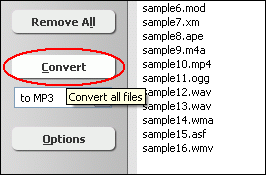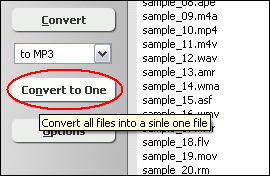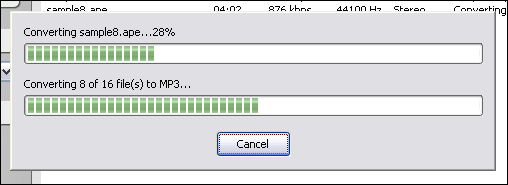ROQ to MP3Convert ROQ to MP3 in Batch, ROQ to MP3 Converter |
 |
| Home | Getting Started | Download | Buy Now! | Screen Shots | FAQ | Support | Contact |
Total Audio MP3 Converter converts ROQ to MP3. The software is an ALL-IN-ONE audio converter that supports more than 150 audio and video files. Total Audio MP3 Converter supports batch conversion and is full compatible with Vista and Windows 7.
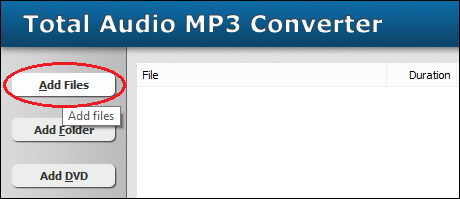 Click on "Add Files" to choose ROQ files and add them to conversion list. 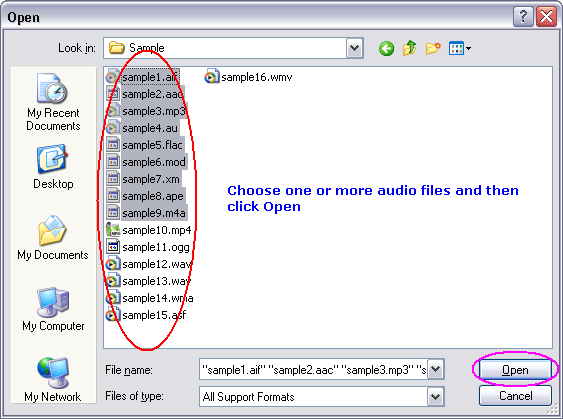 Choose one or more ROQ files you want to convert and then click on Open. 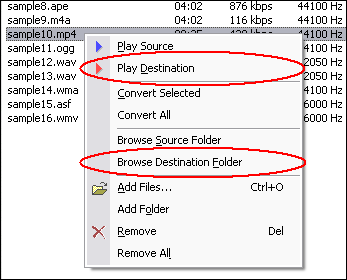 Right-click converted item and choose "Play Destination" to play the destination file, choose "Browse Destination Folder" to open Windows Explorer to browse the destination file. Total Audio MP3 Converter is 100% clean and safe to install.
It's certified by major download sites. What is ROQ? The format runs at a fixed 30 frames per second with an optional 22050 Hz mono or stereo sound track. Videos may technically be up to 65520 x 65520 pixels with both dimensions divisible by 16 and produce a valid RoQ file, but none of id Software's games will play back a video with dimensions that aren't a power of two, most likely because of OpenGL's texture sizing restrictions. NOTE: It's been reported that movies with dimensions greater than 512 x 512 cause issues in various id Software games. Until this can be positively confirmed or denied it's best to avoid higher resolutions. RoQ is a motion compensating vector quanitizer format, similar to Cinepak, but higher quality due to the use of the ITU-R BT.601 colorspace (the same one used in component video, PAL televisions, JPEG and MPEG), whereas Cinepak uses a low-quality YUV-like colorspace designed for faster decoding that often results in gamut degradation before compression even begins. Because it's a vector quantizer, RoQ files are very fast to decode and very slow to encode. Decoding involves nothing more than converting the colorspace of the codebooks and then copying data, whereas encoding involves using several complicated schemes to produce a "palette" of image fragments that will result in the least degradation. RoQ uses two codebooks per frame, with the second being constructed from pieces of the first, with up to 256 entries each. Due to this, only 1024 new colors can be introduced each frame, severely limiting the color gamut. This could arguably be improved by better predicting which sections will be motion compensated, but doing so is difficult, since codebook entries are generated from non-motion-compensated image sections, but whether or not they'll be used depends on the quality of them compared to motion compensated sections, resulting in a chicken-and-egg problem. This is made worse by the fact that all three major RoQ codecs are single-pass. While the format is limited and much lower quality than MPEG and Indeo Video, it was presumedly preferred by id Software because of the lack of royalties, the lack of patent liability that presents a serious problem with most video formats, and the absence of complex platform-specific APIs. What is MP3? ROQ to MP3 Related Topics: DAT to MP3, DIF to MP3, DIVX to MP3, DV to MP3, DVR-MS to MP3, F4B to MP3, F4V to MP3, FLIC to MP3, FLV to MP3, GSM to MP3, M4B to MP3, MIDI to MP3, MTV to MP3, MVI to MP3, MXF to MP3, RA to MP3, RAM to MP3, RM to MP3, RMI to MP3, RMVB to MP3, VID to MP3, VMD to MP3, VQF to MP3, W64 to MP3, AC3 to MP3, ADX to MP3, MP4 to MP3, WMA to MP3, WV to MP3, XM to MP3, MKV to MP3, MMF to MP3, MOV to MP3, MPA to MP3, VOC to MP3
|
| Home | Getting Started | Download | Buy Now! | Screen Shots | FAQ | Support | Contact | Links |
| Copyright © 2006-2017 Hoo Technologies All rights reserved. Privacy Policy |

